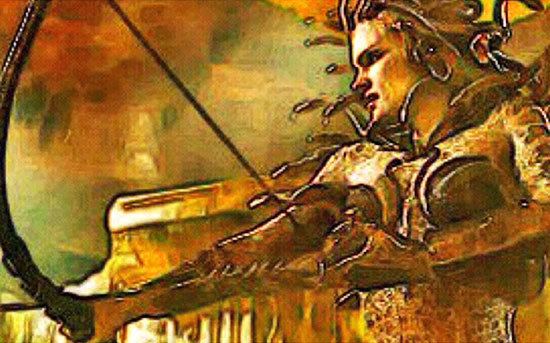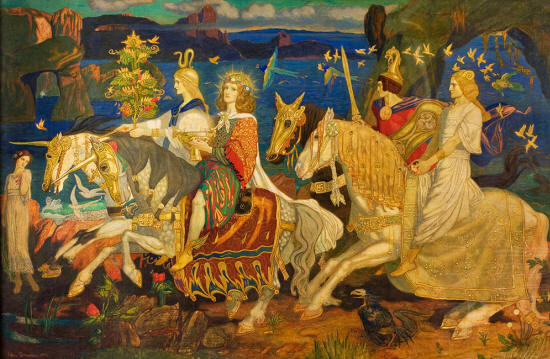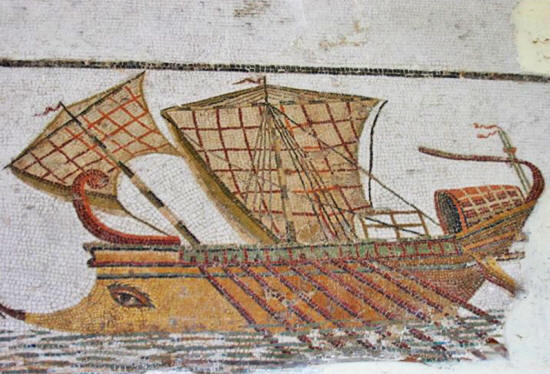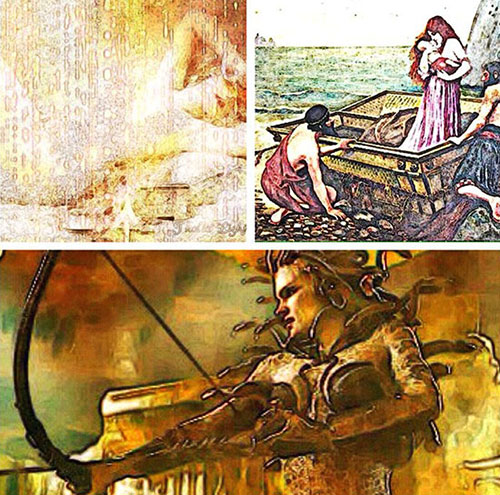|
by Thalia Lightbringer from MessageToEagle Website
Could the Early Irish Celts
have Ties to Ancient Greece?
It sounds like a fairy
story, and some of the evidence does come from mythical tales, but
remember that Troy was found because Heinrich Schliemann took
Homer's tale of the to have some basis in fact.
Homer describes
armor perfectly that was no longer used in his day, later confirmed
by archaeological finds like the boar's tooth helmet.
Plato compared them to "frogs around a pond" in his Works because of their expansive colonization of the area.
Is it possible that they also colonized ancient Ireland?
as depicted in "Riders of the Sidhe" by John Duncan
MerlinPrints.com, Public Domain
These people were said to have godlike powers and The Book of Invasions claims they came in "flying ships", while later versions of this tale changes this to "sailing ships".
They are described as,
The Irish book 'Leadhar
Gadhal' states there were also 24 pairs of colonists who came to
Ireland in 1240 BC led by a Greek prince named Bartoli.
Some could have survived,
however, and it is possible that some of the redheaded Irish are
descended from these "Dananns". Though very few modern Greeks have
fair hair, the ancient Greeks must have been very different,
especially in Mycenean times.
Some Greek gods were also said to have red hair. DNA evidence shows that a great portion of the population of Ireland has genetic ties to the Spanish, showing that the "Children of Mil" story has truth behind it.
The rest are a mixed bag, with many genetic similarities to the British.
Trireme from a Roman mosaic in Tunisia, image taken by Wikimedia user:
Mathiasrex Maciej Szczepańczyk
Indeed, Greece must have
had some influence on the early Irish culture, as many Irish Gaelic
words and early place names have been shown by etymologists to have
origins in the Greek language.
This is because many
ancient Greeks claimed descent from the line of Danae of Argos, who
bore the hero Perseus, famous for killing the Gorgon Medusa.
The Myth of Danae
Image credit:
Thalia Lightbringer
The King wanted a son,
but an oracle told him that not only would he never have a son, but
that his daughter's son would kill him. Akrisios then locked Danae
away in a chamber of bronze to keep her from ever being seen by men.
In this way, he thought to thwart prophecy.
King Akrisios, fearful of the prophecy, put Danae and her son in a chest and set it adrift at sea, hoping that Poseidon, god of the sea, would take care of the problem for him.
Instead, Danae was
rescued by a fisherman named Diktys (Dictys), the brother of
King Polydektes (Polydectes) of the island of Seriphos. Polydektes
later fell in love with Danae and Perseos killed Medusa in order to
rescue his mother from this lustful King.
Greek tales indicate that Danae was descended from an Argive maiden named Io who was loved by Zeus, but forced to travel to Egypt as a cow, because of the jealousy of Zeus' wife Hera.
From Io was descended
Danaus, who supposedly returned from Egypt to Argos with fifty
daughters who were called
the Danaides.
It seems a lot of
Mediterranean people wanted to trace their lineage back to the
princess Danae!
The Romans called it
"Hibernia". Greece did not have a central government, but a
loosely-joined collection of "city states". The Irish organization
was similar, with every province having its own ideas of government.
It is possible that early Greeks also colonized the area, as they were always looking to expand their colonies.
There is not much good land for farming and settlement. It often became necessary to send out colonists looking for greener pastures, as the population growth became too much for the local resources.
The "Emerald Isle" would
have been a tempting jewel indeed!
They seeded the ancient
world with their culture, art, ideas, and their genetics as well,
while looking for trade opportunities and good places to settle. The
Romans adopted many of the Greek ideas and spread the culture
further.
For such a small country,
they certainly left an impressive and widespread legacy...!
|





